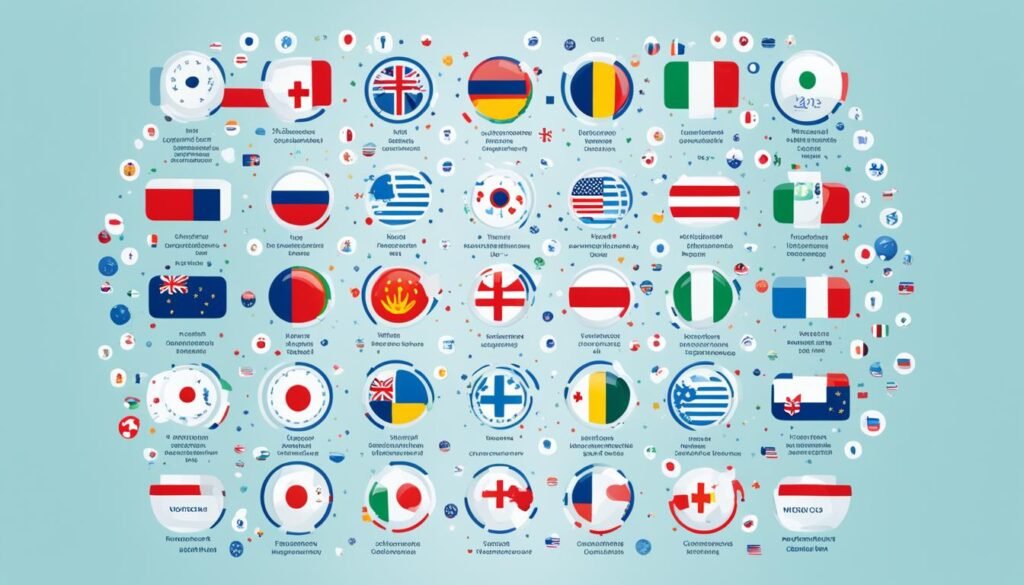Imagine you planned your dream trip, but then you have a medical emergency. Suddenly, big healthcare costs lurk ahead. That’s where international health insurance comes in to help. It’s a safety net for those living or traveling away from home. But how does it all work? And what makes the cost change? What benefits will you get from having this insurance?
International health insurance makes sure you can get quality healthcare no matter where you are in the world. Let’s talk about how much this insurance might cost. Plans could be as cheap as $500 a year if they’re basic. But a full global plan, which includes the US, might cost you up to $8,000 a year. The average yearly cost is around $5,500. This price varies based on your age, health, where you’ll be, and your plan’s details.1
Key Takeaways
- International health insurance steps in with medical coverage for people away from home.
- Costs vary from $500 to $8,000 a year, with most people paying about $5,500 yearly.
- Your age, health, coverage location, and plan details all affect how much you pay.
- Coverage changes with different areas, with costs adjusted accordingly.
- Insurance companies change prices based on healthcare costs in each country.
Introduction to International Health Insurance
International health insurance is for people who live or travel outside their home country.2 It helps them get quality healthcare without worrying about high costs.2 These plans can cover the whole world or just certain areas. They might also include help with medical evacuation or getting back home.3
People in programs like Education Abroad and MSU travelers get this coverage. It comes with International SOS. This gives them help from thousands of medical and safety experts around the globe.3
This insurance covers up to $500,000 for each medical event. It pays 100% for emergency evacuation and there’s no cost to the insured.3 It even helps with mental health support.3
However, this coverage lasts for a year at most and it doesn’t include family members.3 It doesn’t insure against trip cancellations either, but you can get that separately.3 Certain medical needs, like regular check-ups, are not part of the plan.3 Still, you can call International SOS anytime for advice on medical or safety issues.3
Plans can cover many health services, like doctor visits and surgeries.2 They usually work with top medical facilities and doctors. This ensures you get the best care.2 Some plans also pay for vaccinations, exams, and managing long-term health problems.2
More and more, these plans offer help for mental health and well-being.2 They might include therapies or courses on how to meditate. Access to the best medical help worldwide is a key feature.2
Why Do You Need International Health Insurance?
When you’re away from home, regular health insurance might not help much. It often doesn’t cover a lot when you’re abroad. That’s why having international health insurance is crucial.4 With it, you can get medical help almost anywhere in the world.4
Also, some countries need to see you have this insurance to let you in. So, for your safety and hassle-free travel, it’s a must.4
Limited Coverage of Domestic Health Plans Abroad
If you’re on a private health plan, your usual coverage won’t help much when you travel internationally.5 This includes things like doctor visits and hospital care overseas.5 So, it’s important to check if your plan will cover you in another country.5
Plus, U.S. Medicare usually won’t pay for health care outside the country. But there are some exceptions, like needing emergency care during a trip.5
Access to Quality Healthcare Globally
International health insurance can cover many needs, from maternity care to surgery recovery.4 It also pays for emergency medical costs. This includes ambulance rides, seeing a doctor, hospital stays, and COVID-19 care.6
If you’re very sick and need to come back home for treatment, international insurance might cover that too. This can save you a lot of money.6
Mandatory Requirements in Some Countries
Having international health insurance is a rule in some places. It’s needed to visit or live there, especially for seniors who rely on Medicare.4 This helps make sure everyone gets the care they need when they’re away from home.6
Types of International Health Insurance Plans
There are three main types of international health insurance plans. They include worldwide coverage, regionalized coverage, and travel medical insurance. These plans meet the various needs of people living or traveling outside their home country.
Worldwide Coverage Plans
Worldwide coverage helps anyone outside their home country with medical insurance. It offers complete coverage in many countries. Prices can vary, starting at $500 for basic plans up to $8,000 for ones including the USA.1
Regionalized Coverage Plans
For specific regions or countries, there’s regionalized coverage. It’s for those mostly in one area, like Europe or Asia. It costs less because it doesn’t cover high-cost places like the United States.1
Travel Medical Insurance
Travel medical insurance is best for short trips. It’s not as broad as the other plans. It focuses on things like emergency health care and trip interruptions.7
Think about your travel plans and how long you’ll be away when picking a health insurance plan. Consider the areas covered, the deductible, and the maximum coverage. These details decide what the plan will cost and whether it’s right for you.17
Factors Affecting the Cost of international health insurance
International health insurance costs are determined by many aspects. These include the age and health history of the person buying the insurance. Where you need the insurance and the plan you choose also matter.8
Age and Medical History
Young and healthy people pay less for their coverage. But, older folks or those with past health issues might pay more. They may need more medical help as time goes on. This is why their premiums are higher.8
Area of Coverage
The places your insurance covers affect what you pay. If a plan includes costly areas like the United States, it will be pricier. Your home country’s healthcare prices play a big role. For instance, US healthcare is more costly than in Thailand.8
Deductibles and Maximum Coverage Limits
The amount you pay before your insurance starts (deductible) and the most your plan will pay also influence costs. Choosing a higher deductible can lower your premium. But, opting for lower deductibles and higher limits means a more expensive plan.8

Every year, insurance prices might go up because of medical inflation. This rise is due to newer treatments, more elderly people, and better life expectancies. There’s also extra strain on healthcare systems.8
The price for international health insurance varies a lot. It can start at around £434/$500/€503 for the most basic coverage. However, if you want a plan that covers care in the US, the cost can go up to £8,689/$10,000/€10,079.8
Average Costs of International Health Insurance
An international health insurance plan can cost as little as $500 yearly for basic coverage. It can go up to $8,000 annually for full, global coverage, including the U.S.1 Where you live matters too. Places like Hong Kong, the U.S., and Singapore have higher premiums.1 This is because healthcare is more expensive in these areas. Also, the older you are, the more you might pay. People 65 and older usually have higher premiums than younger folks.1
Cost Range
International medical insurance averages $5,500 each year. It can start from $500 for limited benefits to $8,000 for a full package.1 The coverage area matters too. Worldwide plans are more expensive than plans just for Europe. Not including the U.S. in your coverage can save you a lot.1
Costs by Country of Residence
The country you live in affects your premium. For example, in Hong Kong, the average yearly premium is $12,154. In the U.S., it’s $7,205.1
Costs by Age Group
Age impacts how much you pay for insurance. For ages 18 to 24, the yearly cost averages $2,019. Those 65 and over pay around $9,344 annually.1 Your choice of deductible and plan influences the cost too.1
international health insurance for Students and Faculty
International health insurance is a must-have for students and faculty who travel abroad.9 It’s often required for study abroad programs or trips organized by the university.9 Many schools have special plans that offer complete medical coverage for students going overseas.9 There are also plans for faculty and staff. These plans make sure they are well covered while they represent the school in other countries.9
Study Abroad Plan
Plans for international student health insurance are made to fit the needs of those studying in other countries.9 They include medical coverage, emergency evacuation, and bringing remains back home. This is what the host country and school require.9 For students with F-1 visas, buying these plans is a must. They should cover medical evacuation and bringing remains home if there’s a serious health issue.9
University-Sponsored Travel Coverage
Along with the Study Abroad Plan, schools often have a separate travel insurance for faculty and staff.9 This insurance makes sure teachers and administrators have the right medical coverage when they go overseas for the school.9 The details of these plans can change, so it’s key for faculty and staff to check what their school requires.10
International health insurance is very important for both students and teachers in global educational programs.9 Knowing what’s available and what is needed for your trip is essential. This way you can make sure you’re protected while you’re away from home.10
What Does International Health Insurance Cover?
International health insurance covers many medical expenses when you’re outside your home country. This includes emergency treatment, stays in the hospital, and care you get without staying overnight.1 The price can be as low as $500 for basic coverage or up to $8,000 for full coverage that even includes the USA.1 On average, it costs $5,500 a year. The cost depends on your age, health history, where you want coverage, and how much you want to pay out of pocket before the insurance starts helping.1
Emergency Medical Expenses
If you have an emergency health issue while outside your home country, international insurance has your back. It helps with costs for treatment, hospital stays, and any surgeries needed due to sudden health issues or injuries.1 The cost for this insurance varies depending on where you live. For example, someone living in Hong Kong might pay $12,154 a year, while in the USA, it could be $7,205. In Singapore, the average is $6,668, and in the UK, it’s $5,651.1
Medical Evacuations and Repatriations
This type of insurance also covers situations where you need to be medically evacuated to better care or sent home. This is important if you have a severe illness or injury.1 Age affects the cost of this insurance. It goes from $2,019 for those aged 18-24, up to $9,344 for those 65 and older.1
Exclusions and Limitations
Keep in mind, international health insurance might not cover everything. This could include health issues you had before getting the insurance, regular check-ups, and some optional surgeries.1 Companies like IMG Global Medical and GeoBlue Xplorer have different plans available, with prices in US Dollars, Euros, or GBP.1 The cost can change based on where you live, your nationality, where you want coverage, and how much you’re willing to pay before the insurance kicks in.1
Choosing the right international health insurance means carefully checking what it covers and what it doesn’t. You want to make sure it fits your needs perfectly.
How to Choose the Right International Health Insurance Plan
Choose your international health insurance wisely. Think about your trips’ length, how often you travel, the places you visit, and your health history.11
Assess Your Travel Needs
In many places, like when trying to live somewhere, having health insurance is a must.11 Some countries, such as the UK, New Zealand, and Italy, offer free medical care to everyone. This shows that healthcare rules can differ a lot around the world.11
Regular travel insurance works for short trips. But, it’s not the best for stays over six months.11 Global health insurance is great for long stays. It’s ideal for people living overseas, like expats, students, retirees, and digital nomads.11
Compare Providers and Coverage Options
Figure out what you need, then look at a few plans. Check prices and services from different companies.11 The plan costs, what they cover, and your personal info influence the price.11
Reading reviews helps understand if a company is good. It lets you see what others think about the service.11
Read Policy Documents Carefully
Always read your insurance’s details. Know what’s included, what’s not, and when you’ll get your money back.12 Also, having online doctor visits can be very helpful.12
If you need to go to the hospital, make sure you don’t need to pay first (precertification). The best plans start helping you as soon as you need it.12 If you’ve had insurance in France before, you might find some good deals.12 Thinking about extras, like flying home if you’re sick, eye and teeth care, and maternity help, can also be smart.12
Top International Health Insurance Providers
Notable names in international health insurance are GeoBlue, Cigna, IMG, and CISI.13 They cater to people living or traveling outside their homeland. They offer a variety of plans with different coverage and costs.
Cigna Global leads the game, providing Silver, Gold, and Platinum plans.13 These coverages are aimed at everyone needing international health insurance. For example, many Cigna clients opt for additional services like Outpatient care, Worldwide coverage, Health and Wellbeing, and more.13
GeoBlue’s Xplorer plan boasts unlimited benefits across the globe.13 IMG’s Gold level plan combines great coverage with fair prices.13 And William Russell stands out with its Gold, Silver, SilverLite, and Bronze plans. These ensure full coverage for inpatient care and no cap on outpatient care.13
In addition,13 Now Health International has top financial backing from A.M. Best, with an A+ rating.13 Integra Global specializes in crafting insurance plans for those with unique needs.13

Claims and Reimbursement Process
International health insurance claims can work differently based on who you’re with and your coverage. You usually need to hand in lots of documents, such as medical history and costs.14 Many times, you can file a claim using a website or an app.
Documentation Requirements
Insurance companies often want to see your past medical history and any existing conditions.14 It’s smart to give them everything they need upfront. This can make the claim process faster.
Filing a Claim
To get your money back, you need to send in a claim form with all your papers and receipts. Then, the insurance checks what they’ll cover and sends you money, minus any fees you owe.14 Sometimes, the doctor or hospital sends the bill straight to the insurance. But, you might still need to send some forms and details to the insurance yourself.
Reimbursement Timelines
How long it takes to get reimbursed can vary, but it should be done in a few weeks if you’ve sent everything needed.14 The quicker you get all your information in, the faster you can get your money back.14 Some companies, like Cigna Global and Now Health, aim to pay you back within five days if everything is OK.15 William Russell tries to sort things out in five business days and pay you as soon as they can after that,15 and Integra Global looks to pay back within a week if you’ve sent in everything they need.15
To speed up getting your money back, make sure you read and understand your policy, follow the claim instructions carefully, and give clear details about your treatment. Include a detailed list of costs for faster refunds.14 Also, answer quick if the insurance needs more details and send in the right forms for each doctor or hospital visit.14
Tips for Staying Healthy While Traveling Abroad
Staying healthy on a trip is key, and there are steps to cut down risks. First, make sure you have travel vaccinations. Then, keep clean by washing hands and eating safe foods and drinking clean water. Lastly, know where to get help if there is a health crisis.
Travel Vaccinations
You should see a doctor a month before your trip to check if you need any shots.16 The right vaccines can shield you from diseases found in the places you’ll visit.
Preventive Measures
The COVID-19 outbreak has shown how quickly diseases can spread. Remember, good hygiene is vital. Always wash your hands, use sanitizer, and stop touching your face. Choosing drinks without alcohol or caffeine in airports is wise.17 Pack a small health kit too, with essentials like painkillers and bandages.16
Be careful with what you eat and drink. Bad food and water can cause traveler’s diarrhea.16 Bring snacks like pasta or fruit to avoid unhealthy airport food.17 If your hotel has a buffet, make use of hand sanitizer there.17
Outdoor fun like hiking is safer health-wise than indoor activities.17 Try to go places when they are less busy to lower risks and enjoy more.17
Having access to clean toilets during road trips or city visits is a must for staying well.17
Seeking Medical Attention
Drinking enough water is vital as flights can dry you out, causing headaches and dizziness.16 If you get sick on your trip, knowing where to find help is crucial. Always check for travel warnings with the U.S. Department of State. Plus, sign up for the Smart Traveler Enrollment Program (STEP) for alerts.16 When you’re back, see your doctor to ensure you’re in good health still.16 Falling sick abroad can change your plans, sometimes needing you to stay longer for health reasons.16
Follow these tips to lower the chance of getting sick or hurt while traveling. By taking care of your health, your trip will be happier and more smooth.16
Conclusion
International health insurance is important for people living or traveling overseas. It offers broad medical coverage and top-notch healthcare around the world.18 It’s key to know the plan types, cost factors, and how claims work. This helps people choose wisely and get the best insurance for their health while away.
These plans cover things like emergency care, being in the hospital, tests, and medicines.18 They also help with getting back home if needed. But, you must read the policy details. They might not cover everything, especially if you were sick before.18 Costs change based on what’s covered and where. Knowing how to make claims is also important before you buy a plan.18
Having international health insurance is a smart move. It gives people the protection and peace of mind they need. This way, they can focus on exploring new places without worrying about their health coverage.
FAQ
What is international health insurance?
International health insurance offers full medical coverage for people overseas. It lets you get healthcare anywhere in the world.
How much does international health insurance cost?
The cost varies, from around 0 to ,000 a year. This includes coverage in the USA. The average yearly cost is about ,500.
What are the different types of international health insurance plans?
There are three main types: plans with worldwide coverage, those regionalized, and travel medical plans.
What factors affect the cost of international health insurance?
Age, health history, location coverage, and chosen plan limits affect the cost. Deductibles also play a role.
Is international health insurance required for students and faculty traveling abroad?
Yes. Most study abroad and university trips require it. Many schools have special plans for students traveling.
What does international health insurance typically cover?
It covers emergency, inpatient, and outpatient care. It also includes evacuation and repatriation if needed.
How do I choose the right international health insurance plan?
Consider your travel needs carefully. Compare plans and premiums. Always read the policy details to know what’s covered.
What are some of the top international health insurance providers?
Top providers include GeoBlue, Cigna, IMG, and CISI. They cater to people living or traveling around the world.
How does the claims and reimbursement process work for international health insurance?
It varies by provider. You usually need to submit medical records and receipts. Reimbursement can take from days to weeks.
What can I do to stay healthy while traveling abroad?
First, make sure your vaccinations are current. Then, practice good hand hygiene and be cautious with food and water. Know how to get medical help if you need it.
Source Links
- https://www.internationalinsurance.com/health/
- https://www.cignaglobal.com/resources/a-guide-to-international-health-insurance-for-working-abroad
- https://globalsafety.isp.msu.edu/students/health/international-health-insurance/
- https://www.cignaglobal.com/resources/difference-between-travel-international-health-insurance
- https://www.usnews.com/insurance/travel/does-my-health-insurance-cover-international-travel
- https://www.forbes.com/advisor/travel-insurance/travel-medical-insurance/
- https://www.now-health.com/en/blog/travel-insurance-vs-international-health-insurance-what-s-the-difference/
- https://www.april-international.com/en/long-term-international-health-insurance/guide/how-much-does-international-health-insurance-cost
- https://www.internationalinsurance.com/students/
- https://www.imglobal.com/international-student-health-insurance
- https://www.cignaglobal.com/resources/choosing-the-right-health-insurance
- https://www.msh-intl.com/en/how-to-choose-international-health-insurance.html
- https://www.internationalinsurance.com/health/best-companies.php
- https://www.worldtrips.com/travel-medical-insurance/how-does-the-claims-process-work
- https://www.internationalinsurance.com/articles/file-health-insurance-claim/
- https://mphdegree.usc.edu/blog/how-to-stay-healthy-while-traveling
- https://www.internationalinsurance.com/news/8-tips-staying-healthy-while-traveling.php
- https://www.bajajallianz.com/blog/announcements/what-you-must-know-before-opting-for-global-health-insurance.html
More: Biotechnology: finding new solutions to health challenges – All Media Trend





